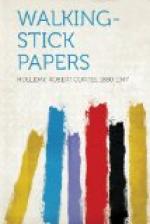When you return from a sojourn of several months in the land of “the language” you are immediately struck very forcibly by the vast number of Americanisms, by the richness of our popular speech, by the “punch” it has, and by the place it holds in the printed page at home. In a journey from New York I turned over in the smoking-car a number of papers I had not seen for some time, among them the New York Evening Post, Collier’s, Harper’s, Puck, and the Indianapolis News. Here, generally without quotation marks and frequently in the editorial pages, I came across these among innumerable racy phrases: nothing doing, hot stuff, Right O!, strong-arm work, some celebration, has ’em all skinned, mad at him, this got him in bad, scared of, skiddoo, beat it, a peach of a place, get away with the job, been stung by the party, got by on his bluff, sore at that fact, and always on the job. I learned that the weather man had put over his first frost last night, that a town we passed had come across with a sixteen-year-old burglar, and that a discredited politician was attempting to get out from under. Perhaps it is not to be wondered at that the Englishman frequently fails to get us.
You note a change in the whole atmosphere of language. A pronounced instance of this difference is found in public signs. You have been seeing in English conveyances the placards in neat type posted about which kindly request the traveller not to expectorate upon the floor of this vehicle, as to do so may cause inconvenience to other passengers or spread disease, and so forth and so on. Over here:
Don’t Spit?
This means You!
This is about the way our signs of this kind go. Now what about all this? I used to think many person just returned from England ridiculously affected in their speech. And many of them are—those who say caun’t when they can’t do it unconsciously. That is, over here. In Britain, perhaps, it is just as well to make a stagger at speaking the way the Britains do. When you accidently step on an Englishman’s toe, it is better to say “I’m sorry!” or simply “sorry,” than to beg his pardon or ask him to excuse you. This makes you less conspicuous, and so more comfortable. And when you stay any length of time you fall naturally into English ways. Then when you come back you seem to us, to use one of the Englishman’s most delightful words, to “swank” dreadfully. And in that is the whole story.
Mr. James declares that in the work of two equally good writers you could still tell by the writing which was that of the Englishman and which that of the American. The assumption of course is that where they differed the American would be the inferior writer. Mr. James prefers the English atmosphere. And the Englishman is inclined to regard us in our deviation as a sort of imperfect reproduction of himself. What is his is ours, it is true; but what’s




